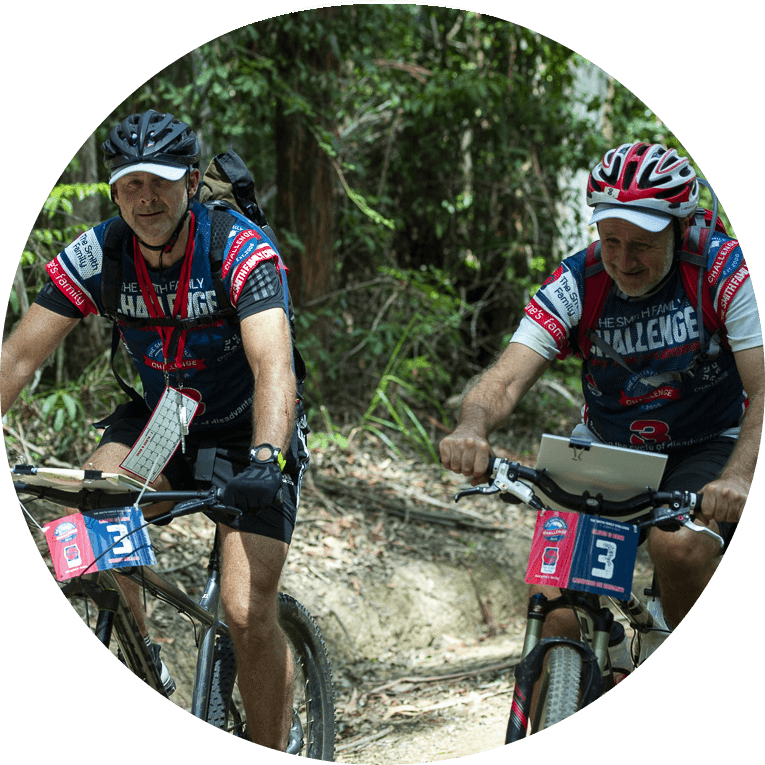Fitness & Training
The Smith Family Challenge is an event achievable by most people, even with moderate fitness levels.
With the exception of a couple of ring-ins (who somehow manage to fit in some secret training sessions) the majority of regular Challenge participants are of average fitness. All you need is some basic training and preparation to ensure an enjoyable event for you and your team.
The basis of The Challenge is that participants will travel approximately “100km over two days”. Travelling 50km per day through wilderness terrain will mean spending approximately 8 hrs on your feet, the bike and kayak. To adequately prepare for the event, you should condition your body for the sensations and fatigue that will set in over a prolonged period of exertion.
Long and Slow VS Short and Fast
Base or endurance training is the bread and butter for longer distance events like The Challenge. Spending time exercising at low to moderate intensity is preferred to short and sharp sessions. If you are starting from a low level of fitness – begin with short and slow sessions like a 30-minute walk or bike ride two or three times a week. Maintain a lower intensity and slowly build up your session time over a 6 - 8 week period until you can comfortably do 1 to 2 hour walk/run/rides.
Training for the Disciplines
The two main disciplines of The Challenge are mountain biking and walking/running. Although you will benefit from general fitness training like going to the gym, playing tennis, soccer etc. you will have to spend some time focusing specifically on the bike and run.
Mountain Biking
The bike makes up the majority of the course distance, as much as 55km over the two days of competition. Whether you own a road bike, commuter or hybrid – any fitness gained through regular riding is transferable to the mountain bike (even stationary bikes help to a certain extent). So if you don’t own a mountain bike, get out on whatever bike you can lay your hands on starting with 30-60 minute rides and building up to 2 hours of pedalling. Your rear end will thank you come race day.
Hills
In past events, hills have been the undoing of many teams.
Hill Repeats (grind up a long hill – turn around and recover on the downhill – repeat) is a quick way of building up your tolerance, albeit in a slightly boring way. Alternatively, include some hilly terrain on your regular ride.
When riding hills, a nice even cadence in the granny gear to keep forward momentum is the way to go. Even the slowest rider up the hill will beat the Challenger pushing their bike.

Walk/Run
For most participants, getting out for a run or walk is the most convenient way to train for The Challenge. Try to incorporate some uneven terrain in your regular run/walk.
A hike through the local national park, along a beach or even on the bush tracks around the home is a perfect way to prepare for the hiking legs. Try and get out for a regular weekly session of around 30 to 60 minutes and use the weekend for longer walks/runs. You should try and work up to at least 2 to 3 hour walks at a lower intensity.
Similarly to the bike training, practice ascending/descending on steepish walking tracks to build up leg strength and endurance. Coastline walking around rock platforms etc. is also a good way to condition the legs for step up/downs on rocky terrain.

Frequency
The big question is always “how much do I need to train to adequately prepare for The Challenge?”
It will depend heavily on your level of base fitness and cycling experience but on average, spending 4-6 hours a week for an 8 week period will be enough to get you through in reasonable harmony. Remember you will be competing with other teams, but more importantly not wanting to slow your own team mates down, given they will never let you hear the end of it.
- Decide how many hours a week you can dedicate to training.
- Target the main disciplines, don’t just focus on one.
- Mix up your session length don’t just do short sessions.
- Frequency is key though, training every other day is preferred over doing one big session a week.
If you require any advice on training or equipment please contact the organisers,
Henry or Simon, on 0431 573 752


